| Srl | Item |
| 1 |
ID:
141593
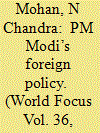

|
|
|
|
|
| Summary/Abstract |
Prime Minister Narendra Modi’s foreign policy has been credited with more achievements than the NDA government’s policies to turnaround the Indian economy. What is so distinctive about his foreign policy? Has he blazed a different trail from his predecessor, Dr Manmohan Singh? Economic diplomacy is a forte they have in common. Both enjoy their foreign travels. During his first year in office, PM Modi visited 17 countries and spent 53 days abroad. This is not very different from Dr Singh’s frequent flyer miles during UPA-11 when he visited 12 countries and spent 47 days outside
|
|
|
|
|
|
|
|
|
|
|
|
|
|
|
|
| 2 |
ID:
144000
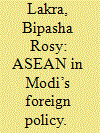

|
|
|
|
|
| Summary/Abstract |
Popular history on India’s foreign policy exaggerates socio-politico and cultural ties of East Asian nations to that of India. It is true to a great extent where religion spread throughout South and East Asia along the trading routes. Indonesia, Malaysia and Thailand embraced Hinduism, while Buddhism flourished in Japan, Vietnam, Korea and China and other countries such as Burma, Cambodia and Thailand too.
|
|
|
|
|
|
|
|
|
|
|
|
|
|
|
|
| 3 |
ID:
153117
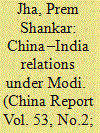

|
|
|
|
|
| Summary/Abstract |
The sweeping changes in the foreign policy of Narendra Modi’s government in India reflect several departures
from previous year. Most prominent shift was from non alignment that was designed to steer India
clear of involvements that could harm the country by diverting its resources from development and social
consolidation into militarisation and war. Another shift is from the policy of equidistance which was not
a refusal to get involved but an assertion that India would choose when, where and how to get involved,
reflecting the rise of India’s soft power. These shifts have ramifications on bilateral relations of India and
China and carry substantial impact on future trends of engagements between the two.
|
|
|
|
|
|
|
|
|
|
|
|
|
|
|
|
| 4 |
ID:
142132


|
|
|
|
|
| Summary/Abstract |
The contributions of Modi in the field of foreign policy have been his visits to Bhutan and Nepal after becoming the prime minister which was unheard of earlier. That has boosted the Himalayan spheres which were ignored for almost seven decades. His invitation to the heads of these countries for his oath taking ceremony was to continue the trajectory of good friendly relations with neighbours while also removing any apprehensions of these nations against India. He seems to be determined to streamline the sea route of India which became the easy route of terrorist outfits. Moreover he has been trying to connect India with the disconnected part of the world. These factors will pay great dividends in the future if India is sincerely committed to shape a strong strategic culture through its cohesive foreign policy.
|
|
|
|
|
|
|
|
|
|
|
|
|
|
|
|
| 5 |
ID:
161793
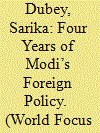

|
|
|
|
|
| Summary/Abstract |
The Foreign Policy of the Modi government which is commonly called Modi Doctrine basically concerns the policy initiatives made towards other states to strengthen the relationships. After assuming the office as prime minister of India on 26th may 2014, he spelled out his vision for India in his first Independence Day address on August 15th 2014, at New Delhi.
|
|
|
|
|
|
|
|
|
|
|
|
|
|
|
|
| 6 |
ID:
148569
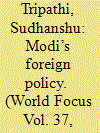

|
|
|
|
|
| Summary/Abstract |
Thus India, instead of meekly following the USA, must confidently assert through its bold and vibrant foreign policy assertions for protecting and preserving its national interests against all challenges and project itself as a responsible and muscular power, capable enough to protect its national security and interests defined according to its own priorities. While misuse of power is certainly wrong and unethical and is also a crime inviting due punishment according to law of the state, the non-use of power by a country even at the cost its own existence or survival is certainly an unpardonable crime as well as sin which none on the earth or THE AUTHORITY (THE ALMIGHTY) above this world will ever forgive.
|
|
|
|
|
|
|
|
|
|
|
|
|
|
|
|
| 7 |
ID:
169430
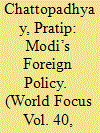

|
|
|
|
|
| Summary/Abstract |
Narendra Modi led BJP government have returned to power for a second consecutive term in India and this time with more thumping majority. Therefore it is expected that the policy directions of the first tenure will be carried on with more concerted effort. Modi in his first tenure innovatively invited all the heads of government of SAARC countries in his sworn-in ceremony and went on to designate his approach towards these countries as ‘neighbourhood first’ policy showing his willingness to prioritise them in India’s foreign policy.
|
|
|
|
|
|
|
|
|
|
|
|
|
|
|
|
| 8 |
ID:
148565
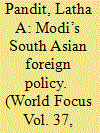

|
|
|
|
|
| Summary/Abstract |
Relations with and policies towards neighbours is of paramount importance in determining the regional and global role of a nation. Peace and security on this front determines the regional environment and strengthens the links of co-operation. Given the asymmetry between India and other states in South Asia, India’s neighbourhood policy determines her capabilities at the regional and global level. Even the world judges a regional power through the prism of the perception of its neighbours. The Modi Government that came to power in 2014 not only continued the previous governments’ policy of good neighbourliness but set a new precedent by inviting the Heads of State of all SAARC countries to the swearing in ceremony and announcing its “Neighbourhood first” policy.
|
|
|
|
|
|
|
|
|
|
|
|
|
|
|
|
| 9 |
ID:
163019
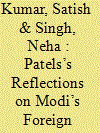

|
|
|
|
|
| Summary/Abstract |
The Prime Minister of India Narendra Modi said so many times, “Had Vallabh Bhai Patel been the first Prime Minister India would have a different country. The problems which we have been facing had been resolved long back.” There is no doubt since the beginning of Modi government, the ideological tussle between the two makers of India; Nehru and Patel has become acute.
|
|
|
|
|
|
|
|
|
|
|
|
|
|
|
|
| 10 |
ID:
162983
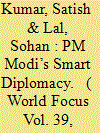

|
|
|
|
|
| Summary/Abstract |
Now the 5th year is approaching of PM Modi’s foreign policy. A number of changes were introduced in the domain of foreign policy; from first neighbourhood to a balancer in the world politics. It has a mixed bag. There are many successes and challenges. The emerging India-US multilayered strategic dialogue with the latest addition of 2+2 and at the same time US attempts to pressurise India on Iran issues have created a chasm between India and America. Indian Prime Minister reconfigured India-Russia relations in the light of emerging world politics.
|
|
|
|
|
|
|
|
|
|
|
|
|
|
|
|